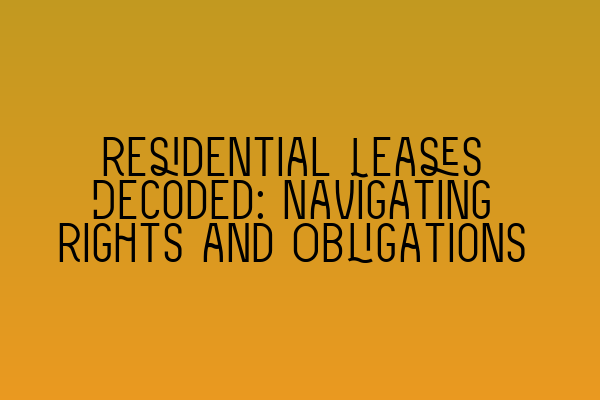Residential Leases Decoded: Navigating Rights and Obligations
Residential leases form a crucial aspect of property law, governing the relationship between landlords and tenants. Whether you are a prospective tenant, a landlord, or a legal professional working in the field of property law, understanding the rights and obligations outlined in a residential lease is essential. In this article, we will decode the complexities of residential leases, exploring the key terms and clauses that shape this legal agreement.
Understanding Residential Leases
A residential lease is a legally binding contract that outlines the terms and conditions under which a tenant can occupy a rental property. It sets out the rights and responsibilities of both the tenant and the landlord, providing a framework for their relationship during the tenancy period.
When entering into a residential lease, tenants need to pay careful attention to the specific terms and clauses included in the agreement. Understanding these provisions is crucial to ensure that your rights as a tenant are protected throughout the duration of the tenancy.
Key Terms in a Residential Lease
While the terms of a residential lease can vary, there are several standard clauses that are typically included in these agreements:
- Rental Period: This clause specifies the duration of the lease agreement, outlining the start and end date of the tenancy.
- Rent Amount and Payment Terms: The lease will clearly state the amount of rent that the tenant is obligated to pay, as well as the frequency and method of payment.
- Security Deposit: This clause outlines the amount of the security deposit required, as well as the conditions under which it may be withheld at the end of the tenancy. It is important for tenants to understand their rights regarding the return of the security deposit.
- Maintenance and Repairs: This clause sets out the responsibilities of both the tenant and the landlord regarding maintenance and repair of the rental property. It is important to clearly understand who is responsible for what.
- Restrictions and Prohibitions: The lease may include restrictions or prohibitions on certain activities, such as pet ownership or subletting, that the tenant must adhere to.
- Termination Clause: This clause outlines the conditions under which either the tenant or the landlord can terminate the lease before the agreed-upon end date.
Tenant Rights and Obligations
Tenants have a range of rights and obligations that are protected by law. It is important for tenants to be aware of these rights in order to ensure a fair and comfortable tenancy. Some key tenant rights include:
- Right to Quiet Enjoyment: Tenants have the right to live peacefully in the property without interference from the landlord.
- Right to Repairs: Landlords are responsible for ensuring that the property is well-maintained and in a habitable condition, which includes addressing any necessary repairs.
- Right to Privacy: Tenants have the right to privacy, and landlords must provide notice before entering the property for non-emergency situations.
Tenants also have certain obligations to fulfill during the tenancy, such as paying rent on time, keeping the property clean and well-maintained, and adhering to any restrictions or prohibitions outlined in the lease.
Landlord Rights and Obligations
Just as tenants have rights, landlords also have their own set of rights and obligations. While these rights and obligations can vary depending on the jurisdiction, some common ones include:
- Right to Collect Rent: Landlords have the right to collect rent from tenants in a timely manner.
- Right to Inspect the Property: Landlords have the right to inspect the rental property periodically, provided they provide reasonable notice to the tenant.
- Obligation to Maintain the Property: Landlords are responsible for maintaining the property, ensuring that it meets health and safety standards.
Understanding the rights and obligations of both parties is crucial for creating a harmonious tenancy and mitigating potential disputes.
Seeking Legal Advice
If you are a tenant or a landlord and have concerns about your rights and obligations under a residential lease, it is advisable to seek legal advice. A property law solicitor can provide valuable guidance and help you navigate any complex legal issues that may arise during the tenancy.
At SQE Property Law & Land Law, our team of expert solicitors specialize in property law matters and can offer comprehensive advice tailored to your specific needs. We provide legal support for both tenants and landlords, ensuring that their rights are protected and their obligations are met.
For more information on our legal services or to book a consultation, please contact us.
Related Articles:
